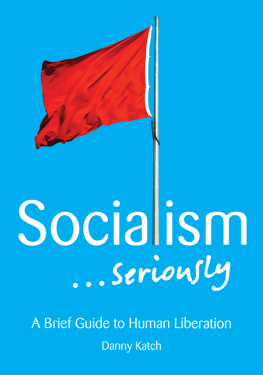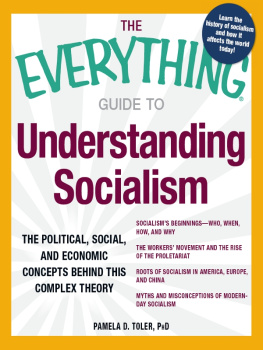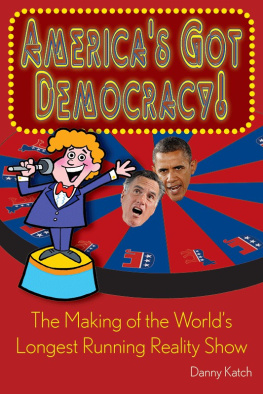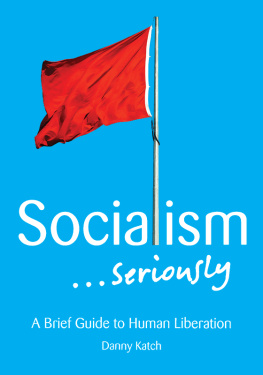Danny Katch - Socialism . . . Seriously: A Brief Guide to Human Liberation
Here you can read online Danny Katch - Socialism . . . Seriously: A Brief Guide to Human Liberation full text of the book (entire story) in english for free. Download pdf and epub, get meaning, cover and reviews about this ebook. year: 2015, publisher: Haymarket Books, genre: Science / Politics. Description of the work, (preface) as well as reviews are available. Best literature library LitArk.com created for fans of good reading and offers a wide selection of genres:
Romance novel
Science fiction
Adventure
Detective
Science
History
Home and family
Prose
Art
Politics
Computer
Non-fiction
Religion
Business
Children
Humor
Choose a favorite category and find really read worthwhile books. Enjoy immersion in the world of imagination, feel the emotions of the characters or learn something new for yourself, make an fascinating discovery.
- Book:Socialism . . . Seriously: A Brief Guide to Human Liberation
- Author:
- Publisher:Haymarket Books
- Genre:
- Year:2015
- Rating:5 / 5
- Favourites:Add to favourites
- Your mark:
- 100
- 1
- 2
- 3
- 4
- 5
Socialism . . . Seriously: A Brief Guide to Human Liberation: summary, description and annotation
We offer to read an annotation, description, summary or preface (depends on what the author of the book "Socialism . . . Seriously: A Brief Guide to Human Liberation" wrote himself). If you haven't found the necessary information about the book — write in the comments, we will try to find it.
Socialism . . . Seriously: A Brief Guide to Human Liberation — read online for free the complete book (whole text) full work
Below is the text of the book, divided by pages. System saving the place of the last page read, allows you to conveniently read the book "Socialism . . . Seriously: A Brief Guide to Human Liberation" online for free, without having to search again every time where you left off. Put a bookmark, and you can go to the page where you finished reading at any time.
Font size:
Interval:
Bookmark:
Contents
Dig Deeper
Polls conducted in recent years have found that almost a third of Americans
The media response to these polls is revealing. Coverage focused almost entirely on the results among young people, which prompted many articles about generation gaps and those crazy millennials. By contrast, I couldnt find a single analysis outside the radical left press about the far more dramatic results among people of color. People of color are going to be a majority of this country by 2050, but those in power dont seem to give a shit about their opinions on how this place should be run. On the bright side, at least Blacks and Latinos were counted in distinct categories, unlike many other groups that might have unique perspectives about capitalism, such as folks with disabilities, Native Americans, or even that tiny segment of the US population known as women.
It also shouldnt be surprising that nobody in the media cared what poor people think about capitalism, even though there is a widespread assumption that low-income white folks in the middle of the country are almost all Republicans who put conservative values over their own economic self-interest. This has been a convenient myth for the Democrats, who often tell supporters that they sure would like to tax the rich and eliminate poverty but dont want to scare away less educated voters with such radical talk. (Speaking of the Republicans and Democrats, both parties have an average approval rate of about 40 percent, only a few percentage points higher than socialism. So why dont we have a Socialist third party? Thats a long story and a subject for another book... which I wrote. )
What is more relevant for this book is the fact that these polls even happened. Until a few years ago, nobody asked Americans for their views on capitalism and socialismnot even the middle-class white ones! Its a remarkable thing to consider. Every day we are asked to like a product web page or stay on the line to complete a customer survey, but until recently no major polling organization had ever sought our opinion about the economic system that sets the terms for every decision we will ever make. Sometimes were asked if we think the economy is improving or if president whoever has been good for the economy, but never whether we think this economy itself is rational.
This is less conspiracy than closed-mindedness. It probably never used to occur to pollsters to question capitalism, which would have made as much sense to them as polling anteaters about their opinion of ants. So what changed? Thats no mystery. The great economic crisis of 2008 not only threw millions out of their homes, jobs, and colleges, but it did so in the most obviously unjust way imaginable. In case youve blocked it from your memory, heres a recap in four steps:
1. Financial institutions commit massive fraud that brings the world economy to a halt because not even the bankers know how much of their money is real and how much is fake.
The US government bails out the criminal banks with trillions of dollars.
3. The same government then doesnt help the millions facing layoffs, foreclosures, and student debt because of the recession caused by the banks.
During this process, George Bush is replaced in the White House by the very different Barack Obama, and yet almost nothing changes.
No piece of socialist propaganda could make the case any clearer. These four steps read like an IKEA instruction manual for how to assemble an unjust system. Inequality had been growing for decadesfrom 1979 the richest one-tenth of the One Percent saw their incomes quadruple while the number of people in poverty grew by fifty million. But that was a slow, mysterious process. In 2008 people saw the same thing happen within a few months, and it was obviously the result of a system that was stacked against us.
2008 was a glitch in the Matrix, a clue that all this time our supposedly fair and democratic system was an elaborate hologram. To switch metaphors, if we were all unwitting participants in a play called Capitalism about a world where people are rich or poor because they (or their ancestors) had earned that station in life, then in 2008 the back wall of the set fell down, revealing all the elaborate rigging equipment behind the scenes.
And yet the show must go on, so we continue to go to work and school as if nothing happenedbut we cant erase what we saw. In millions of conversations in the last few years, someone has uttered these five words: They bailed out the banks. The topic could be local school budget cuts or fast-food workers going on strike. The speaker could be seventeen or seventy, a longtime radical or someone who hates politics.
This is the environment in which pollsters got the idea to find out what people think about capitalism. To even ask the question is somewhat to answer it. Capitalism, Terry Eagleton writes in Why Marx Was Right , is in trouble when people start talking about capitalism. It indicates that the system has ceased to be as natural as the air we breathe, and can be seen instead as the historically rather recent phenomenon that it is. Moreover, whatever was born can always die.
Its been hard for capitalism to pass itself off as natural over these past few years. Banks like Goldman Sachs and JP Morgan Chase may have gotten away with crashing the world economy and still making a profit, but even they couldnt fool us into thinking that was in accordance with the laws of nature. Nobody looked at the massive government bailouts from Presidents Bush and Obama, took a deep, wondrous sigh, and thought, Ahh, the circle of life.
Unfortunately, corporations also havent forgotten about the bailouts, which taught them a terrible lesson: if you are too big to fail, you can get away with literally anything. Unlike many people these days, I use the word literally literally. Consider the case of HSBC bank, which was caught laundering billions of dollars for Mexican drug cartels and groups linked to al-Qaeda. That is so villainous we can only assume that company board meetings took place in a secret lair inside a remote island volcano. And yet because HSBC was considered too big to fail (or jail), it got off with no criminal charges. Think about that the next time you see the police throwing a Black kid up against a wall looking for drugs or read about a Muslim suspected of terrorism without any hard evidence.
What all this means is that even though the sharp crisis of 2008 and 2009 eventually faded, the normal capitalism that weve returned to isnt even the same place we were inor if it is, we are seeing it with new eyes. It is a capitalism that has dispensed with even a pretense of justice or efficiency and openly operates on the principle that might makes right.
The bald-faced immorality goes far beyond bailouts. Because corporations have enough money to buy off politicians with what to them is just pocket change, most of them pay lower tax rates than someone making a salary of $40,000 a year. Huge firms like Boeing and General Electric havent paid a cent in taxes over the past five yearsat a time when the government claims it cant possibly figure out where to find the money to keep bridges from collapsing, tuition to public universities from soaring, and food stamps from being cut.
Even the tech companies have lost their halos. Remember when Apple was idolized as a bohemian rebel, capable of making any product cool with a sleek design, a cute ad campaign, and a $200 price bump? Apple was supposed to be a new breed of businessan iCorp. Today its widely seen as just another bunch of soulless suits who horribly exploit Chinese factory workers, produce junk products designed to break or be obsolete in three years, and set up bogus headquarters in countries with lower tax rates.
Capitalism is being widely questioned today because the past few years have shown that what is good for this thing called the economyusually defined by stock prices and growth ratesdoesnt have much to do with what is good for most of us. As the polls show, those with the most doubts are those who have gotten the rawest deal: African Americans have faced the highest rates of layoffs and foreclosures. Latinos have seen their communities broken up by the most deportations in the countrys history. Poor people have endured cuts to every vital service, from public transportation to assistance heating their homes. Adding insult to injury, each of these groups has been scapegoated as freeloaders while the real leeches of taxpayer dollars remain above the clouds in their private jets.
Next pageFont size:
Interval:
Bookmark:
Similar books «Socialism . . . Seriously: A Brief Guide to Human Liberation»
Look at similar books to Socialism . . . Seriously: A Brief Guide to Human Liberation. We have selected literature similar in name and meaning in the hope of providing readers with more options to find new, interesting, not yet read works.
Discussion, reviews of the book Socialism . . . Seriously: A Brief Guide to Human Liberation and just readers' own opinions. Leave your comments, write what you think about the work, its meaning or the main characters. Specify what exactly you liked and what you didn't like, and why you think so.











